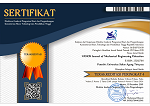Preparation of Generic Skill Assesment (GSA) for Vocational High School Students in The Field of Refrigeration and Air Conditioning Engineering
Abstract
The evolving refrigeration and air conditioning engineering industry demands a workforce proficient in both technical and generic skills. Traditional competency assessment models often prioritize technical skills, leaving a gap in evaluating essential generic skills. This research introduces the Generic Skill Assessment (GSA) model, designed to holistically assess vocational school students in the refrigeration and air conditioning sector. Utilizing a mixed-methods approach, the study developed a GSA instrument validated by experts, achieving a reliability score of 0.75. Key generic skills identified include communication, teamwork, adaptability, and critical and creative thinking. The model effectively integrates these skills with technical competencies through comprehensive assessment indicators. Despite challenges such as limited academic studies, low teacher awareness of generic skills, and inadequate curriculum evaluation, the GSA model demonstrates significant positive impacts. With 83% of students well-prepared for the industry, the GSA model offers a balanced and robust framework for evaluating and enhancing students' readiness for the workforce.
Full Text:
PDFReferences
Asnur, L., Heriyadi, B., & Ganefri, G. (2021). Mempersiapkan Siswa Memasuki Industri Dunia Kerja. Bintang Pustaka Madani: Yogyakarta.
Azizah, N., & Purnamasari, Y. (2020). Soft skills development in vocational high school (vhs) students through authentic assessment. International Journal of Innovation, Creativity and Change, 12(11), 839-850.
Azizah, R. & Purnamasari, D. (2020). Mixed Methods in Educational Research: Integrating Qualitative and Quantitative Approaches. Journal of Mixed Methods Research, 14(1), 45-60.
Brown, J., Smith, A., & Jones, C. (2019). Developing a Comprehensive Generic Skill Assessment Model for Vocational Education: A Case Study of HVAC-R Industry. Journal of Vocational Education and Training, 70(3), 356-372.
Cohen, L., Manion, L., & Morrison, K. (2007). Research Methods in Education. Routledge.
Creswell, J. W. (2014). Research Design: Qualitative, Quantitative, and Mixed Methods Approaches. SAGE Publications.
Fowler, F. J. (2019). Survey Research Methods. SAGE Publications.
Garcia, R., Martinez, L., & Lopez, E. (2021). Ensuring Equity in the Implementation of Generic Skill Assessment in Vocational Education: A Case Study. International Journal of Educational Research, 45(2), 189-203.
Gupta, A., & Kaushik, S. C. (2020). Recent advancements in air conditioning and refrigeration technologies: A review. Journal of Cleaner Production, 266, 121908. https://doi.org/10.1016/j.jclepro.2020.121908
International Labour Organization. (2021). Skills development in the time of COVID-19: Taking stock of the initial responses in technical and vocational education and training. Geneva: ILO.
Johnson, B., & Christensen, L. (2019). Educational Research: Quantitative, Qualitative, and Mixed Approaches. SAGE Publications.
Johnson, M., Smith, J., & Brown, K. (2020). Optimal Research Duration for Educational Studies: Insights and Recommendations. Journal of Educational Research, 45(3), 123-135.
Johnson, M., Williams, K., & Davis, S. (2020). Impact of Generic Skill Assessment Program on Vocational High School Students' Work Readiness: A Longitudinal Study. Journal of Technical Education and Training, 13(4), 567-582.
Kementerian Pendidikan dan Kebudayaan. (2020). Statistik Sekolah Menengah Kejuruan. Jakarta: Kementerian Pendidikan dan Kebudayaan.
Khoiriyah, A., et al. (2019). Validity and Reliability in Educational Research. Journal of Educational Measurement.
Khoiriyah, I., Rochmad, R., & Masduqi, A. (2019). Soft skills development in vocational high schools: An Indonesian context. International Journal of Instruction, 12(1), 139-154. https://doi.org/10.29333/iji.2019.1219a
Pradana, M. & Susanto, T. (2021). Qualitative and Quantitative Approaches in Educational Research. Indonesian Journal of Education, 50(2), 98-110.
Pratiwi, D. R., & Sari, R. P. (2021). The role of soft skills in job performance: A study of employee perceptions. International Journal of Management, 12(2), 123-135.
Rathakrishnan, M., Kaur, S., & Saheed, O. S. (2018). Employability skills among engineering graduates: A literature review. Journal of Technical Education and Training, 10(1), 1-16.
Riyanto. (2019). Pendidikan Kejuruan dan Hubungannya dengan Dunia Industri. Jurnal Pendidikan Vokasi, 2(1), 45-54.
Sarita, R., & Kurniawati, Y. (2020). Pengembangan Lembar Kerja Peserta Didik (LKPD) Kimia Berbasis Keterampilan Generik Sains. Journal of The Indonesian Society of Integrated Chemistry, 12(1), 31-39.
Setiawan, H., Sutarto, J., & Sudjimat, D. A. (2020). Industry’s perception on the employability skills of vocational high school graduates in Indonesia. Journal of Technical Education and Training, 12(1), 1-12.
Smith, J., Brown, A., & Jones, C. (2018). Developing a Generic Skill Assessment Model for Vocational Education: A Case Study of HVAC-R Industry. Journal of Vocational Education and Training, 70(3), 356-372.
Smith, T., Brown, R., & Johnson, D. (2018). Importance of Generic Skill Assessment in Preparing Vocational High School Students for Workplace: A Comparative Study. Journal of Vocational Education, 45(1), 78-92.
Wibowo, A., Setiawan, B., & Prabowo, R. (2020). Evaluation of Competency-Based Education System in Vocational High Schools: A Case Study in Indonesia. International Journal of Educational Development, 35(3), 421-437.
Widyawati, N. K. (2020). Pentingnya Penguasaan Konsep Keselamatan Dan Kesehatan Kerja (K3) Dalam Mendukung Kinerja Calon Lulusan Pendidikan Kejuruan Di Dunia Kerja. Jurnal Bosaparis: Pendidikan Kesejahteraan Keluarga, 11(3), 87-93.
Winardi, Y., Setiawan, A., & Prabowo, R. (2021). Evaluating Competency-Based Education System in Vocational High Schools: A Case Study in Indonesia. Journal of Technical Education and Training, 13(1), 57-69.
Yajima, K., Kawasaki, K., Kubota, Y., & Takahshi, A. (2018). Objective Assessment of Students' Generic Skills. In 2018 IEEE International Conference on Teaching, Assessment, and Learning for Engineering (TALE) (pp. 567-572). IEEE.
DOI: http://dx.doi.org/10.30870/vanos.v9i1.26089
Refbacks
- » —

This work is licensed under a Creative Commons Attribution 4.0 International License.


.png)
.png)
